


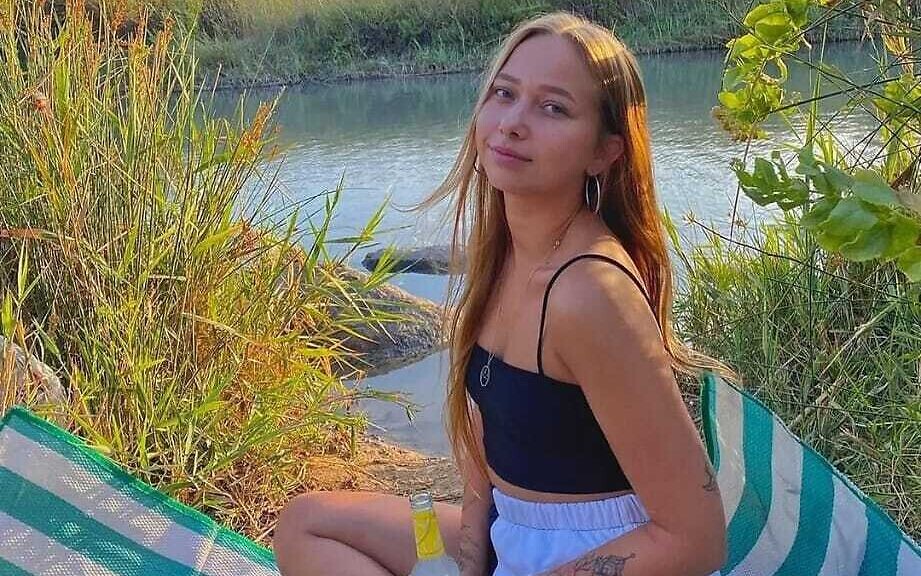
A bill seeking to allow terror victims not recognized as Jewish under halacha (Jewish law) to be buried in Jewish cemeteries failed to pass its preliminary reading in the Knesset on Wednesday. Representatives of some civil society groups condemned the outcome, calling it a stark sign that Israel has yet to internalize the lessons of October 7, 2023.
Merely days after the Hamas-led massacre left close to 1,200 people dead, Rabbi Seth Farber, head of the religious rights organization ITIM, sent a letter to Israel’s chief rabbis.
As the country was grappling with chaos and uncertainty, with many people missing and hundreds of bodies to identify, Farber was worried that those among the terror victims who were not halacha Jewish would not receive a proper burial.
“I wrote to [the chief rabbis] that just like the army has a way to bury people in a Jewish burial, even if there are questions about their Judaism or they haven’t finished a conversion, we should apply those rules to people who were killed in terrorist attacks,” he told The Times of Israel over the phone.
Traditionally, Jewish law requires Jews to be buried in a Jewish cemetery, separate from gentiles.
In Israel, only those who are considered Jewish under the Chief Rabbinate’s criteria (children of Jewish mothers whose Jewishness is proven, or those converted by recognized rabbinical courts) are officially recognized as Jewish and can be buried in Jewish cemeteries.
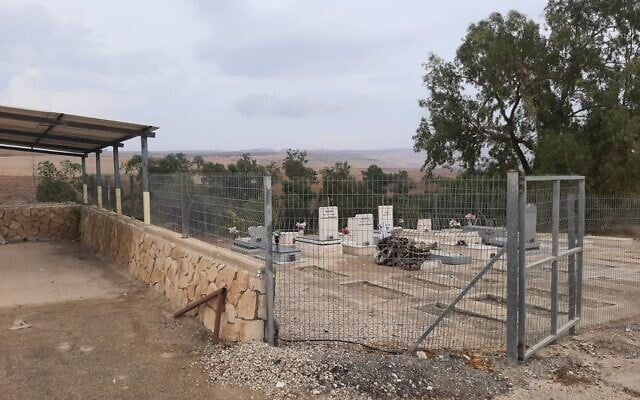
At the same time, the Law of Return also allows people who do not meet these criteria to immigrate to the country, including children of a Jewish father, grandchildren of at least one Jewish grandparent, or spouses and children of Jewish immigrants.
For this reason, over half a million Israelis are not officially recognized as Jewish in the country, and registered at the Interior Ministry as individuals of no religion. The near totality of them are new immigrants or their descendants, although they are part of Israeli society in every other perspective, including in their army service.
“Some 640 days ago, the response I got was ‘we know how to handle this, don’t worry,'” Farber said. “As we saw, this was not a good solution.”
On October 30, 2023, Alina Plahti, 23, who was killed at the Nova Music Festival, was buried at a separate compound of Beit She’an’s New Cemetery, contrary to the wishes of her family, who said the young woman was very passionate about Judaism and was pursuing a conversion process.
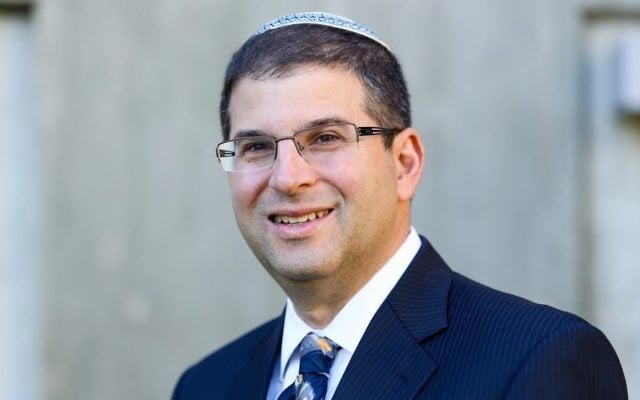
Aware of the opposition to the bill by several MKs ahead of the vote in the Knesset, on Tuesday, Plahti’s mother, Olga, told Channel 12 that her daughter “was Jewish enough in the eyes of the terrorists, but not for the Knesset members.”
In a different case, all four members of the Kapshetar family, Dina, Evgeny, Aline (8), and Ethan (5) Kapshetar from Dimona were killed on October 7 and buried outside the fence of the cemetery in Dimona because Evgeny was not Jewish. Rather than separate the family, Dina’s parents decided to bury their daughter and grandchildren next to Evgeny.
ITIM worked to get both members of the coalition and the opposition on board to change the relevant laws with a bill allowing terror victims registered as of no religion to be buried in Jewish cemeteries if the families chose so.
Speaking with The Times of Israel, Farber stressed that this could be done within the boundaries of halacha, through solutions that have already been applied by the IDF Chief Rabbinate for years, allowing soldiers who lose their lives while serving the state of Israel to receive a proper burial in a military cemetery.
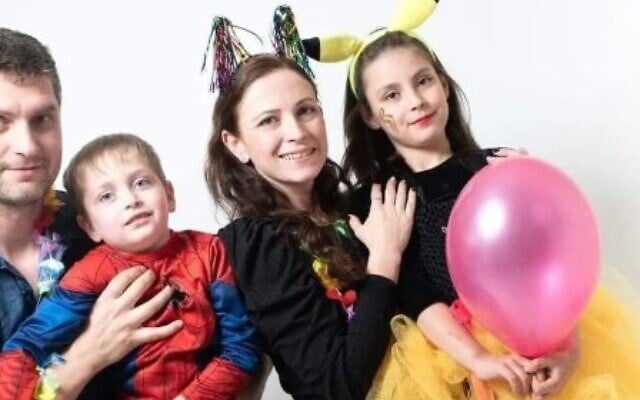
“Around 2011, the army started to bury [soldiers not halachally Jewish] inside the fence, but in a separate plot, then in 2017 it began to bury them in the same plot but keeping a two-meter separation [between the the tombs] and finally in 2020 they came up with a new solution,” Farber explained.
“The graves are dug 20 centimeters deeper than usual, and an inner lining is added inside, basically functioning as a separation,” he said.
Opening the Knesset session for the preliminary vote on the bill on Wednesday, opposition MK Chili Tropper from the Blue and White party emphasized how the goal of the new legislation was to apply the same solution also to terror victims.
“This bill is based, among other things, on the rulings of many rabbis, who have determined that a non-Jew killed in a hostile act can be buried alongside a Jew, as is actually done by the Military Rabbinate,” Tropper said.
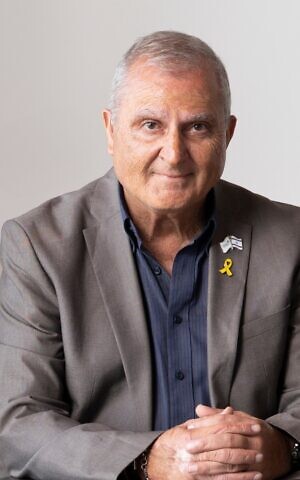
However, the argument was rejected by Jerusalem and Jewish Heritage Minister Meir Porush from the Haredi party United Torah Judaism, who said the policy “may benefit those families who lack religion, but at the same time it has the potential to hurt the feelings of thousands of Jewish families who want and are interested in burying their loved ones according to Jewish law.”
Religious Affairs Minister Michael Malchieli said the issue should be solved exclusively by the Chief Rabbinate.
“This is a purely halachic issue; it is not a matter for the Knesset,” he said. “If you really want to solve this problem, then go to the Chief Rabbinate of Israel. Whatever it decides, I will follow it.”
The bill failed to pass with 31 votes in favor and 45 against.
“I am really angry,” Abie Moses, chairman of the National Organization of Terror Victims (NOVT), told The Times of Israel over the phone.
“It cannot be that a girl comes from Russia, or from anywhere, at the age of three, or five, or six, and she’s not Jewish, lives in Israel till the age of 18, joins the IDF, and she fights for us, and because of her, I’m sleeping well at night, me and my family and those guys sitting up there in the Knesset, and they do not allow her to be buried in the Jewish cemetery,” Moses told The Times of Israel over the phone.
“They should be ashamed of themselves,” he added, noting that if the IDF found a solution to the problem for soldiers, the same should be done for civilians.
Moses also remarked how the opposition to the bill among members of ultra-Orthodox parties was especially unacceptable, since members of the ultra-Orthodox community usually do not serve in the army.
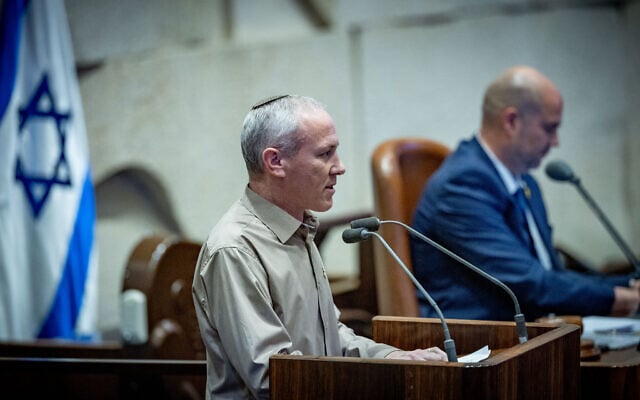
“She served in the army, she was taking care of you,” Moses says, referring to the case of Plahti. “Where were you?”.
Farber echoed the sentiment, suggesting that there was “a certain irony that the Haredim, who don’t even serve in the army, are putting a stop to the solidarity that is so necessary today in Israeli society.”
“It’s just another example of how we haven’t learned the lessons that October 7 should have taught us,” he said. “We need to come up with a way for people who are killed like this to receive the full respect they deserve.”
According to Israeli law, after a bill fails, it cannot be included in the Knesset agenda for six months, but Farber vowed to keep fighting.
“We will have to see where the political constellations are in another six months, to see whom we can work with and whom we can’t,” he said.
